The silver-haired actor Harry Van Gorkum — who as soon as starred in Buddies as Monica’s British ‘soulmate’ Don — stands in a luxurious condo in his underwear and appears confidently on the digital camera.
‘Now we’re snug, let’s speak urine leakage,’ he says, holding up an incontinence pad for males which he guarantees ‘slips discreetly into my underwear’.
Not so way back it could have been unthinkable to see this on prime-time TV.
However whereas it’s plain that promoting like that is serving to open up conversations round incontinence, critics warn that this type of advertising and marketing additionally exploits individuals’s embarrassment — encouraging them to purchase merchandise to absorb leaks as an alternative of searching for medical assist for an typically treatable drawback.
In the meantime, there are considerations that individuals in hospital or care houses, significantly older sufferers, are falling sufferer to a ‘pad tradition’, which signifies that, even when they aren’t incontinent, they’re put in nappies (after which left in them for hours).
Incontinence impacts multiple in 5 individuals within the UK and demand for merchandise to deal with it’s hovering.

Buddies actor Harry Van Gorkum in an advert for Tena the place he holds up an incontinence pad that he guarantees ‘slips discreetly into my underwear’
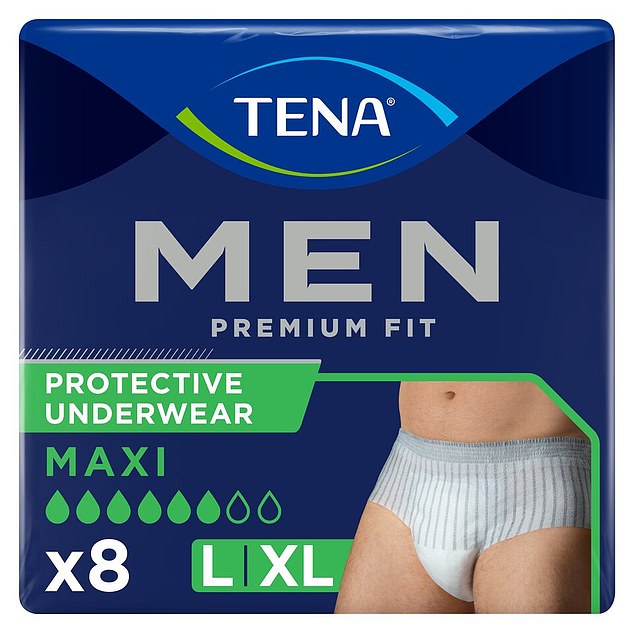
Incontinence impacts multiple in 5 individuals within the UK and demand for merchandise to deal with it’s hovering
From ‘grownup nappies’ which, like child nappies, come as pull-on pants or wraparound pads with sticky tabs; to washable, reusable pants; or stick-on pads and liners worn inside underwear, gross sales elevated by 13.2 per cent within the yr to March.
Final yr we spent a staggering £234 million on these merchandise, in keeping with market knowledge analyst Kantar, with round 1.16 billion particular person gadgets offered — that’s equal to 37 incontinence merchandise purchased each second.
The UK is much from alone: clients within the U.S. account for a few third of worldwide spending on incontinence merchandise, European nations for one more quarter — however gross sales are rising most quickly in Asia, significantly in China, India, South Korea, Taiwan and Japan.
Certainly, the Japanese producer Oji Holdings has not too long ago introduced that it’s switching from making child to grownup nappies due to altering demand.
Arguably, it’s a financially savvy transfer, too, as a result of producers can cost extra for bigger grownup merchandise.
In Tesco, a packet of 12 medium Tena grownup nappy pants prices £8.55 (71p per nappy) — child nappies had been lower than a 3rd of the value, with a pack of 64 dimension 5 Pampers nappy pants costing £14 (22p per nappy).
What’s behind rising demand?
Intelligent promoting could also be driving gross sales (extra on that later) however specialists imagine that failings in care are additionally fuelling the rise — with too many individuals ending up in nappies for treatable issues.
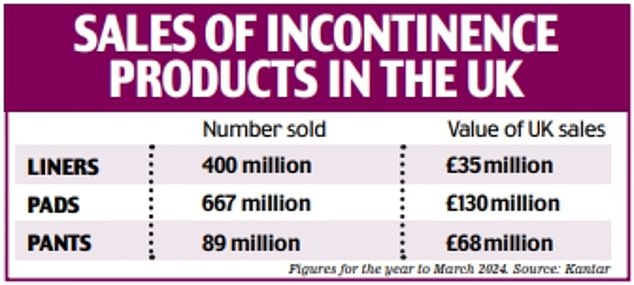
The worth of incontinence liners, pads and pants within the UK is rising. It’s thought that intelligent promoting could also be driving gross sales
Incontinence shouldn’t be an sickness however a symptom of different well being issues, corresponding to harm to the bladder and bowel or the pelvic flooring muscle tissues that help them.
It can be attributable to neurological issues corresponding to Parkinson’s illness or a number of sclerosis, and the side-effects of sure drugs, together with HRT (hormone substitute remedy) and a few antidepressants.
Analysis means that round one in three girls within the UK experiences some type of leaks (typically owing to wreck sustained throughout being pregnant and childbirth); menopause also can set off or worsen signs, as hormonal adjustments scale back the elasticity and energy of the pelvic flooring.
In males, incontinence turns into extra widespread in later life — round one in ten over 65 experiences leaks, sometimes as the results of an enlarged prostate or therapy for prostate most cancers.
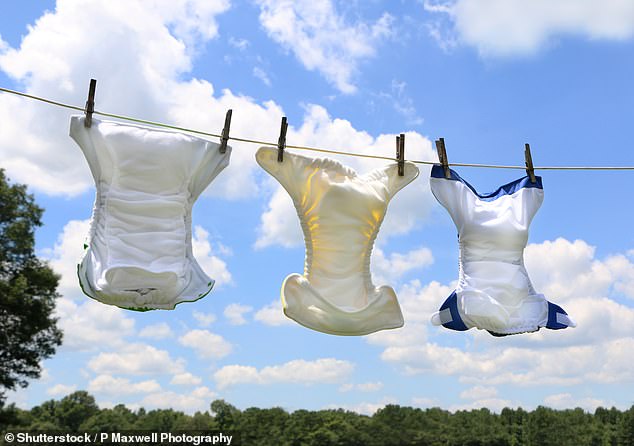
Incontinence is usually extra widespread later in life, with round one in ten over-65s experiencing leaks
Weight problems is one other danger issue — extra weight and physique fats put strain on the bladder and its supporting muscle tissues; so, too, is getting older.
Though incontinence impacts all ages, it’s way more widespread in older individuals, and one of the widespread causes for them being admitted into care or nursing houses.
The NHS says roughly a 3rd of care residence residents and two-thirds of nursing residence residents expertise urinary and/or faecal incontinence.
However NHS England is evident — incontinence is often treatable.
The well being service already spends round £80 million a yr on incontinence pants and pads (or ‘containment merchandise’, because it calls them) however says their use needs to be saved to a minimal and ‘therapy [of incontinence] should all the time be the popular possibility’.
Below NHS pointers, individuals experiencing incontinence needs to be assessed by specialist workers to rule out any critical underlying issues and/or have a drugs evaluation with a GP.
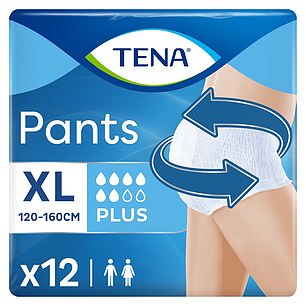
A month’s provide of incontinence pants from the grocery store prices round £87
As soon as a trigger is established, conservative therapies for each women and men embrace dietary recommendation (for instance, avoiding caffeine, alcohol and synthetic sweeteners which might irritate the bladder, and growing fibre consumption for wholesome bowels) and pelvic flooring muscle workout routines and/or bladder retraining, to show sufferers methods to wait longer between lavatory visits.
If these don’t work, sufferers are supposed to be referred to a specialist and could also be given treatment (to enhance muscle tone or alter the physique’s indicators about when to urinate) or supplied surgical procedure, corresponding to procedures to help the bladder.
‘Containment merchandise can provide safety and luxury, serving to individuals proceed with their regular each day actions. Nonetheless, they’re expensive [a month’s supply of incontinence pants from the supermarket costs around £87], can have an effect on an individual’s dignity and don’t provide a long-term answer until the particular person has not responded to different therapies,’ the steerage provides.
It is vital that males with signs search therapy as quickly as attainable as a result of incontinence is usually a signal of an underlying well being drawback, corresponding to an enlarged prostate, says Hamid Abboudi, a marketing consultant urological surgeon at Imperial Faculty Healthcare NHS Belief and founding father of londonandsurrey urology.com.
‘Should you discover any adjustments to your urine movement, it is best to see a health care provider,’ he provides.
‘Should you depart it too lengthy, it may be a lot tougher to deal with and might trigger lasting harm to the bladder or kidneys.’
With girls, most circumstances of incontinence are associated to pelvic flooring harm and are often treatable, says Tina Mason, a specialist pelvic physiotherapist on the personal Girls’s Well being Brighton clinic.
‘The pelvic flooring muscle tissues are like every other muscle tissues within the physique,’ she says.
‘Should you injured your leg, you wouldn’t simply drag it round behind you. It needs to be the identical along with your pelvic flooring.
‘It’s all the time good to get these items sorted earlier slightly than later, however even if you find yourself into your 70s and 80s, a physio may give you tailor-made workout routines to enhance or cease incontinence signs. It’s by no means too late.’
If signs worsen due to adjustments round menopause, in addition to pelvic flooring workout routines, oestrogen hormone lotions and vaginal moisturisers can enhance tissue elasticity, she provides.
A ‘pad-happy’ hospital tradition
The Royal Faculty of Nursing (RCN) says giving extra individuals entry to pelvic flooring and bladder-training programmes would enhance their high quality of life and save the NHS cash on incontinence merchandise and hospital admissions.
However, as an alternative, older sufferers specifically are being pushed into utilizing grownup nappies.

Older sufferers specifically are being pushed into grownup nappies when in hospital, although entry to pelvic flooring and bladder-training programmes may assist enhance their high quality of life
A 2022 report by the Nationwide Institute for Well being and Care Analysis (NIHR) highlights the concentrate on ‘containment’ as an alternative of therapy in each hospital and neighborhood care settings, in addition to a scarcity of workers coaching on incontinence.
Different analysis in 2022 recognized an endemic ‘pad tradition’ in hospitals, the place older individuals — significantly these with dementia — had been routinely given wraparound nappy-style pads ‘no matter independence, mobility, capability and performance’, with the intention to scale back the variety of ‘interruptions’ to workers.
Within the examine, led by Professor Katie Featherstone, a medical sociologist on the College of West London, researchers noticed six geriatric wards in hospitals in England and Wales for 180 days.
They discovered that nurses and healthcare assistants who felt below enormous strain to get via their each day care duties on time usually ‘deprioritised’ incontinence care and would go away sufferers sitting in unchanged pads ‘till the timetable allowed’.
Healthcare workers felt it could take ‘too lengthy’ to encourage sufferers to go to the toilet, or help them to stroll there.
As a substitute, fears that sufferers may fall meant many had been ‘typically discouraged and infrequently forbidden’ from going to the toilet independently and instructed to make use of incontinence pads.
Professor Featherstone and her group mentioned such ‘pad cultures’ weren’t attributable to ‘a malicious act or poor care on the a part of ward workers’, however had been felt mandatory to ensure that workers to maintain up with the tempo of the timetabled rounds of routine duties they needed to perform.
Paradoxically, researchers famous the pads usually leaked, smelled and triggered pores and skin harm — corresponding to nappy rashes and sores — creating further work for employees. And incontinent sufferers who had been put in cumbersome pads ‘simply in case’ discovered it harder to stroll to the toilet, so ended up needing extra help.
The authors warned that there appeared to be ‘little recognition’ amongst workers of the misery having to make use of pads or sitting in dirty pads triggered sufferers — and that always this misery was written off as a part of their dementia.
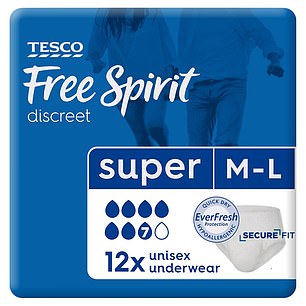
Fears that sufferers may fall when on the way in which to the toilet meant many are instructed to make use of incontinence pads
One other examine, on the College of the West of England in Bristol in 2021, discovered an analogous ‘over-reliance’ by NHS hospital workers on utilizing wraparound nappy pads for older sufferers.
‘Interviewees [spoke] of pads being supplied as a matter in fact, with out first figuring out want, suitability, profit or danger. This conference was summed up by one workers nurse when admitting: “We are inclined to get pad completely satisfied,” ’ the researchers reported within the journal BMJ Open High quality.
In a 2021 assertion on the problem, the RCN described poor incontinence care as ‘distressing and degrading for people’, in addition to costing the NHS via elevated danger of infections, strain ulcers and falls.
Comparable points may be seen in neighborhood care, says the NIHR.
For sufferers like Thomas (his identify has been modified), 92, this could have devastating results on dignity and psychological well being.
The retired author is frail and bedbound after a fall at residence six months in the past. Native authority carers go to his London condo for simply quarter-hour 4 occasions a day, after they assist him to clean, eat and take his drugs.
Thomas shouldn’t be incontinent however as a result of there isn’t any one to assist him stroll the few metres from his mattress to his lavatory between these quick visits, he has to make use of a nappy.
‘I hate it, however what can I do?’ he says.
Carers counsel that pads needs to be modified at the least each 4 to 6 hours, or as quickly as they’re dirty, to scale back the chance of rashes and sores.
But many sufferers like Thomas haven’t any selection however to attend till their subsequent care go to.
If he has to make use of the nappy after his 6pm night-time go to, he has to attend till his subsequent go to, at 8.30am, to be modified.
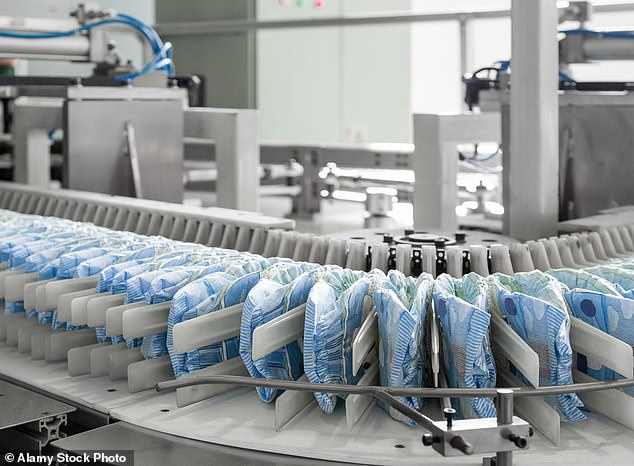
Analysis in 2022 recognized an endemic ‘pad tradition’ in hospitals, the place older individuals had been routinely given wraparound nappy-style pads ‘no matter independence, mobility, capability and performance’
Helen Walker, chief govt at Carers UK, says: ‘As councils battle to fulfill social care demand, they may typically advise unpaid carers to make use of incontinence pads slightly than present further care.’
As cuts to native authority care provision imply fewer sufferers with mobility points are supplied with round the clock care, it appears inevitable that this can result in extra being made to make use of grownup nappies.
And, whereas sufferers with extreme signs could also be entitled to obtain some pads on the NHS, provide is restricted and kinds are sometimes cumbersome and uncomfortable.
As Helen Walker says: ‘The pads supplied should not all the time appropriate, leaving many carers to buy them privately.
‘Some then battle to say their buy as a disability-related expense as their native authority could argue that pads are already supplied by the NHS, even when they’re unusable.’
A separate challenge driving gross sales of grownup incontinence merchandise is lengthy NHS ready lists to see specialists: there are at the moment greater than 400,000 individuals on the ready record for urology in England alone, and sufferers are being pressured to purchase incontinence merchandise whereas they anticipate therapy.
Girls misled by advertising and marketing
On the different finish of the spectrum, middle-aged adults with delicate signs are being focused by advertising and marketing campaigns encouraging them to purchase incontinence merchandise, whereas there’s little public details about obtainable therapies. In Tena’s newest advert, for instance, Harry Van Gorkum waves at his underwear by which he claims to be carrying a pad, saying: ‘You’d by no means know’, as a slogan tells males they’ll ‘maintain management’ through the use of the product.
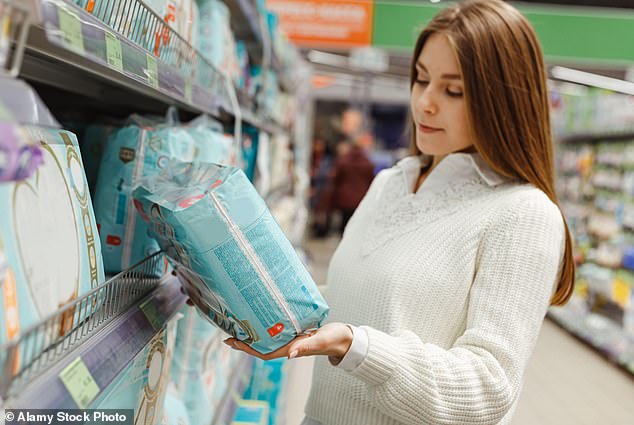
Center-aged adults with delicate signs are being focused by advertising and marketing campaigns encouraging them to purchase incontinence merchandise
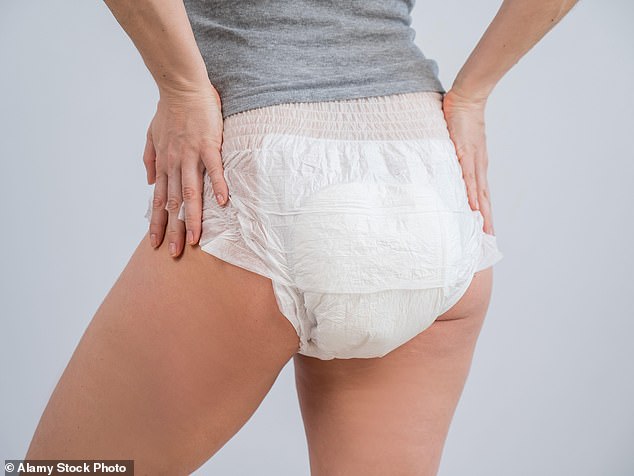
Normalising the usage of merchandise for delicate signs dangers may discourage girls from searching for therapy
The one reference to getting therapy is a line of small print beneath which states: ‘Don’t hesitate to hunt healthcare recommendation when you expertise urine leakage.’
This, says Mr Abboudi, is ‘unusual wording’.
‘The message needs to be: Should you want a product like this, it’s essential to see a health care provider first to work out the trigger,’ he says.
‘It’s not regular to be incontinent — it’s not a pure a part of ageing and shouldn’t be portrayed in that manner.
‘We already know from analysis that males are inclined to under-report signs and current to a health care provider fairly late, with probably long-term penalties, corresponding to kidney harm.
‘Males can really feel incontinence is embarrassing however in addition they typically don’t see it as an necessary drawback, in order that they downplay it.’
In 2019, the RCN reported Tena to the promoting watchdog after it ran an analogous advert for brand spanking new moms, which the nursing union claimed portrayed postnatal incontinence as ‘inevitable’ and implied that girls ought to put on nappy pants, slightly than informing them they may get therapy.
A lthough the watchdog dismissed the grievance, Essity, which owns Tena, instructed Good Well being it has consulted with the RCN on the wording of its adverts.
In addition to TV advertisements, some incontinence product firms use social media to focus on people based mostly on their age, intercourse, pursuits and shopping historical past — and promote them merchandise on-line that are delivered direct to their door.
The ‘simpler entry and discreet buying choices’ supplied by on-line purchasing is driving gross sales, significantly amongst youthful clients of their 30s to 50s, in keeping with market researcher World Market Insights.
Within the UK final yr, gross sales of liners for delicate incontinence — which is extra widespread amongst youthful girls — elevated at a 40 per cent larger fee than for pants and pads, Kantar figures present.
Normalising the usage of merchandise for delicate signs dangers discouraging girls of all ages from searching for therapy, warns Tina Mason.
‘A whole lot of girls inform me it’s “OK” as a result of they solely use a “skinny” liner, for example,’ she says. ‘However that’s not OK — it is best to nonetheless be capable of go about your life, bounce and train with out having to make use of a pad. What you want is assist to verify your pelvic flooring is functioning.’


